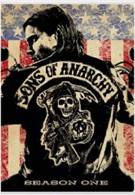I think that I, in an unassuming way, am equipped with a healthy level of testosterone within my physiology, what with my fantasy-football team, beer gut, and generally male genitals. However, I would feel like a piece of shriveled femininity if I were a character on FX's biker-drama Sons of Anarchy, even when put up against the women, who are cut from the same rough-and-tumble fabric as the men. After watching this 13-episode season in two marathon sessions, I feel like I've attained a prison record and a 24-hour five o'clock shadow. The show celebrates hard drinking, hard living, and the complex threads of brotherhood, all more affecting than I anticipated. Gorgeous tattoos, roaring engines, and shoot-em-ups aside, the show's strength is its central theme that family and unity are pinnacles of the human condition. Granted, it explores this issue through a fog of roaring engines and stolen guns, but it occasionally transcends this as characters question their place in the world at large, rather than solely within the SAMCRO (Sons of Anarchy Motorcycle Club, Redwood Original) faction. I'll never own a leather jacket, but if I did, it would strangely have something to do with this show. FX is just behind HBO as a force to be reckoned with in terms of compelling storytelling, though its shows often lose steam after a couple of seasons. Season 2 of Sons of Anarchy begins soon, so time will tell how it fares [Or you can check out our review by clicking here – Ed.], but this premiere season is a walloping must-see capsule of drama, in that the shows should be viewed entirely in order. I can't think of many dramas nowadays (C.S.I.s and Law & Orders aside) that require anything anything but sequential viewings. I don't know if this Bochco-born tactic should hold majority rule, but it's hard to deny the continuing intrigue it creates. The show scores extra points with me by completely foregoing the "Previously On..." route, jumping into the shit right where the last episode left off. This means I can hit "Play All" without having to worry about fast-forwarding through three length-hoarding minutes of reminders. There are too many characters and plot arcs to allow for repetitious backlogs. In fact, I wish I could include a pamphlet listing all cast members and roles.
Speaking of the cast, it’s a rolodex of talent. Charlie Hunnam plays Jackson "Jax" Teller, son of the late SAMCRO founder John Teller and Gemma (the good'n'sexy Katey Sagal), who eventually married throbbing hard-on Clay Morrow, played with damned fine superiority by Ron Perlman. Clay co-owned a mechanic shop with John and took over as club leader when John died. (A drinking game not relegated to just this show is to take a drink whenever Perlman's head is the biggest thing on camera. Are you drunk yet?) It's telling how these three characters, with all of their hellbent conceit and disillusionment, carry on as a strong, though not perfect, family. The actors sell every line, particularly Sagal, whose part was written specifically for her. Now these three actors I will namedrop, but there are dozens more, and no one disappoints, not even Taryn Manning. It's a veritable who's-who of character actors, and part of the fun is in recognizing them.
Clay and right-hand man Tig are all about authority and making money the best way they know how, by running guns to rival and friendly drug gangs (Mayans, Blacks, and Supremacists) around the area of Charming, CA, specifically to keep their drugs outside of Charming. The S.O.A. have quite a bit of say-so where local police are concerned; the police chief and at least one officer are on their payroll. The club meets regularly in the same giant building as the auto shop, where there's a bar and a meeting room dubbed the "chapel." We can assume that prior to the pilot episode, things were going quite well for SAMCRO. But nobody wants to watch outlaws live comfortably.
The season begins with one of two dominating arcs that are fleshed out as things progress. One is set off by a Mayan-caused explosion of a warehouse where the club keeps its weapon supply. A lot of movement within this plot consists of stealthy attacks on other gangs, non-stealthy attacks on other gangs, bribes, police coercion, body dumping, double crossing, bullet dislodging, and many attempts to make more money. The A.T.F. becomes an oddly unprofessional threat early on, and not just to SAMCRO. Things go from bad to worse to tragic. Every problem's solution leads to two more problems, threatening to disintegrate the rigid ties between club members, particularly between Jax, ever the idealist, and Clay, hardcore realist with a messiah complex. (I suppose realism and messiahs are conflicting thoughts. Ooh, more conflict.) The first season intentionally mirrors Shakespeare's Hamlet, and you can vaguely read into that to get an idea where things are going.
The second major arc revolves around Jax in and of himself. In the pilot, his junkie ex-wife gives birth to a baby boy, Abel, 10 weeks early due to continuous drug use. His health is questionable, and he has to stay hospitalized for an extended period. The child is not one that Jax anticipated, and Abel's presence weighs heavily on his conscience and moral compass. Abel's doctor, Tara (Maggie Siff), was Jax's high school sweetheart before she ran off to Chicago, where her love-live suffered from a bit of a stalker problem. Her reappearance in Jax's life is another spoke in his wheel of uncertainty. So ingrained in his rebellious lifestyle, he has little room to step back and view things subjectively. He actively wonders if there's a different path that his life should take, while most of the others only wonder how to further their same path along. A large part of Jax’s soul searching stems from finding a typewritten manuscript John Teller wrote; its subject matter circles around the amiable origins of the S.O.A, and how the progressive unlawfulness went against his own coda. While this plot device, which continues throughout the season, gives Jax some self-conflict and allows him screen-time to wallow in his problems, it makes Jax look like a doofus. There can't be more than 150 double-spaced pages, yet Jax takes this thing with him all over the place and reads the shortest passages possible as if it were a Confucius day calendar. The thoughts contained within are generic and could probably be substituted for the words of anyone who's ever started something they believed in. And they definitely shouldn't take longer than an extended coffee break to read through.
It's hard to speak about specific plot details, because one thing leads to another, and knowing some things too early can take away from the climaxes of later episodes. Suffice to say, there are very few dull moments. All the plots gravitate around each other and have clear through-lines, so there's no worrying about characters you haven't seen in a while, or things going unresolved. The show blows through the incidental bullshit and just piles on the story. Things get particularly testy by the middle of the season, when the A.T.F. takes over the sheriff's office and a wickedly vicious Ally Walker steps in as Agent Stahl. One or more of the Sons are witnessed committing a crime, and for the first time that we've seen, Clay's wall of cocky confidence cracks, which makes for some tense, machismo-infused deliveries. Now I'm zipping my lips. If watching all that two-wheeled adrenaline wasn't enough for you, fear not. The set, shown in a dazzling 1.78:1 widescreen ratio with 5.1 Dolby surround sound, is stacked. No, wait – a motorcycle metaphor. The set, blah blah blah, is really revved up. Ahem. Four episodes have commentaries, each with a slew of people, most of them entertaining. There are an assload of deleted and extended scenes that really did nothing for me. Nothing bombastic was revealed, so you might as well skip them. There's a 10-minute making-of featurette that has a bit of face-time with series creator Kurt Sutter, who really has a big heart for this project, as do the cast and crew.
Then there are the usual first-season concept featurettes. We start with "The Ink," which is impressive. The crew created their own aesthetic for the logo, and each member of the cast got to pick their own tattoos, many of which followed in a similar style. There's lots of skulls and crows (Sam Crow, SAMCRO – it's referred to both ways). Next up is "The Bikes," equally as impressive. Each cast member got to pick their own wheels, and each one gets a few seconds to name their bike. Great, classic motorcycles. Next is "Casting Sons of Anarchy," which is just what it says, an hour-long intro to each of the actors and characters they play. It's not really an hour long, but there are over a dozen actors in a row, so it felt longer. Finally, there's "Anarchy on the Set," part gag reel/part goofing off. It made the shoots look really fun, but didn't spark too much laughter, though part of it is the cast dropping the F-bomb, which they couldn't do on FX.
Your Daily Blend of Entertainment News
So, it's not a show for kids. Did I mention that? There's tons of cursing, sex, and drug use, and even more acts of violence. The Sons swing more fist than Ike Turner and aren't slow on the gun draw, though the show does pick and choose carefully who dies and who doesn't. It's not just bodies everywhere all the time. And all of these things are shown in detail-heavy sets and well-executed (sometimes too close-up) direction, and the soundtrack is a lot of real rock'n'roll. Some Black Keys and Curtis Stigers. There it goes. I promised myself I would compare this movie to Brian Bosworth's modern epic Stone Cold, but I failed. This show is so much better anyway.

Nick is a Cajun Country native and an Assistant Managing Editor with a focus on TV and features. His humble origin story with CinemaBlend began all the way back in the pre-streaming era, circa 2009, as a freelancing DVD reviewer and TV recapper. Nick leapfrogged over to the small screen to cover more and more television news and interviews, eventually taking over the section for the current era and covering topics like Yellowstone, The Walking Dead and horror. Born in Louisiana and currently living in Texas — Who Dat Nation over America’s Team all day, all night — Nick spent several years in the hospitality industry, and also worked as a 911 operator. If you ever happened to hear his music or read his comics/short stories, you have his sympathy.

